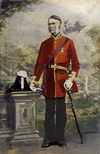McLEOD, ALEXANDER, deputy sheriff and storekeeper; b. 17 Jan. 1796 at Carnoustie, Forfarshire (Angus), Scotland; m. Ellen Morrison by whom he had several children; d. 27 Sept. 1871.
After a brief, youthful career in the British army during the Napoleonic Wars – he was discharged as a sergeant from the 127th Lancers – Alexander McLeod emigrated to Upper Canada in the early 1820s. On two occasions he began a grocery business, first in Kingston and then in York (Toronto), with indifferent success. McLeod’s relationship to the “Family Compact,” and the web of local official groups which sustained it, is obscure. He did secure an appointment as deputy sheriff of the Niagara District, and turned out, in the defence of Toronto, for the skirmish at John Montgomery’s tavern in early December 1837.
It was in the aftermath of the rebellion that McLeod was thrust into prominence. His official duties often took him to the Buffalo, New York, area. Here he learned, on Christmas eve 1837, that the American steamboat Caroline was to be used to supply rebel William Lyon Mackenzie* and his followers who had established themselves on Navy Island in the Niagara River just above the falls. McLeod conveyed this information to the Upper Canadian authorities, and later accompanied the small party led by Commodore Andrew Drew which confirmed the report. On the night of 29 December, Drew took a raiding party across the river to the American side where the Caroline was moored at Schlosser’s Wharf. The ship was seized after a brief scuffle in which one man, an American named Amos Durfee, was killed. The unmanned Caroline was towed into the river, set afire, and allowed to drift a short distance downstream where it sank. Despite the lurid accounts that still persist, especially in American textbooks, it did not go plummeting down Niagara Falls ablaze. There is no evidence that Alexander McLeod was involved in the raid.
Not surprisingly, American opinion, particularly in the northeast, was incensed at this violation of sovereignty. Great Britain and the United States were already at odds over the disputed boundary between New Brunswick and Maine, and tension increased. Protracted discussions between the two countries brought no resolution; and then, enter Alexander McLeod. In November 1840 he was arrested in Lewiston, New York. It was alleged (falsely) that he had boasted openly of his participation in the cutting out of the Caroline. McLeod was indicted by a state grand jury for arson and murder, and bound over for trial.
Lord Palmerston, the British foreign secretary, demanded McLeod’s release, arguing that the attack on the Caroline was authorized by the proper authorities in Canada and the unfortunate McLeod could not be held personally liable. If he were convicted and hanged, Palmerston thundered, his death would be avenged. Daniel Webster, the new American secretary of state, was prepared to accept the British interpretation, but he could not intervene directly. New York state refused to surrender its jurisdictional rights in the case, although it did agree to change of venue to Utica, some distance from the inflamed Niagara district. Opinion in England, however, viewed this step as so much federalist sophistry and the newspapers of both countries indulged in a fit of warlike bombast.
The administration of William Henry Harrison had no wish for hostilities. When Palmerston left office, the prospect for an amicable resolution improved. In any case, William H. Seward, governor of New York, informed Webster that if McLeod were convicted a pardon would be granted. The trial took place in October 1841, closely covered by the newspapers. McLeod was able to produce a satisfactory alibi and was acquitted.
The American Congress repaired the constitutional difficulty the following year with legislation which provided that in such cases involving aliens the federal government could claim jurisdiction. With the McLeod case settled, Webster and Lord Ashburton proceeded to resolve the Caroline affair itself by a diplomatic nicety. Ashburton did not, in fact, extend a formal apology for the violation of American sovereignty, but regretted that an apology had not been made.
As for Alexander McLeod, he returned to the relative obscurity from which he had so bizarrely emerged. Once again he became a store-keeper, this time in Drummondville (now part of Niagara Falls), Upper Canada. As a result of repeated petitions (he also went to England in the 1850s to press his claims), he was awarded a pension of £200 in 1855 to assuage his wounded feelings. He was further compensated in 1866 by an appointment as justice of the peace in Welland County.
PAC, RG 5, A1, 1837–40; B43; RG 7, G1, 108–11, 226–27, 241, 244–49, 253–54, 454–56; RG 8, I, A1, 35, 610. PAO, McLeod-Morrison papers. PRO, FO 414. Arthur papers (Sanderson). Head, Narrative. Trial of Alexander M’Leod, for the murder of Amos Durfee; and as an accomplice in the burning of the steamer Caroline, in the Niagara River, during the Canadian rebellion in 1837–8 (New York, 1841). Craig, Upper Canada. A. B. Corey, “Public opinion and the McLeod case,” CHA Report, 1936, 53–64. Alastair Watt, “The case of Alexander McLeod,” CHR, XII (1931), 145–67.
© 1972–2024 University of Toronto/Université Laval
Cite This Article
J. E. Rea, “McLEOD, ALEXANDER,” in Dictionary of Canadian Biography, vol. 10, University of Toronto/Université Laval, 2003–, accessed April 20, 2024, http://www.biographi.ca/en/bio/mcleod_alexander_10E.html.
The citation above shows the format for footnotes and endnotes according to the Chicago manual of style (16th edition). Information to be used in other citation formats:
| Permalink: | http://www.biographi.ca/en/bio/mcleod_alexander_10E.html |
| Author of Article: | J. E. Rea |
| Title of Article: | McLEOD, ALEXANDER |
| Publication Name: | Dictionary of Canadian Biography, vol. 10 |
| Publisher: | University of Toronto/Université Laval |
| Year of publication: | 1972 |
| Year of revision: | 1972 |
| Access Date: | April 20, 2024 |











